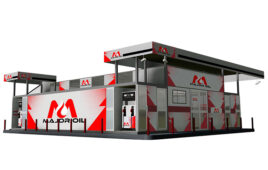
Foodservice training is imperative for any convenience store operation, both to maintain reliable quality standards and to keep the workspace’s sanitation in peak condition. If both of these goals are met, customers will grow to trust the store’s ability to provide high-quality meals and snacks.
Foodservice training may vary from c-store chain to c-store chain, but the bottom line should always follow three basic tenets, according to John Matthews, president and CEO of Gray Cat Enterprises, a Raleigh, N.C.-based management consultant company.
“Customers want to be assured that each and every time they purchase food from your store they get: 1.) consistent product quality; 2.) high-quality customer service; and 3.) all of this done in a safe and sanitary way,” Matthews explained.
One area that is critical and often overlooked is inventory management, he added.
“Storing and rotating inventory by using the FIFO (first in, first out) method can help control food costs as well as ensure that your customers get the freshest products available,” he continued.
Matthews suggested that a combination of training devices should be used since “not all employees learn the same way.”
“It’s one thing to know the ingredient order on a sandwich, for instance, but executing that assembly at the make station can be an entirely different skillset,” he stated.
Foodservice Training Operations
At Pak-a-Sak’s 23 (soon to be 25) convenience stores in the Texas Panhandle, each new hire is assigned to a seasoned staffer for 25 to 30 hours of training in everything from hot food holding times to handling freezer-stored food to wrapping aesthetics, said Samantha Olson, manager of Pak-a-Sak’s Lubbock, Texas, location.
“We emphasize that people eat with their eyes first, so even the wrappings should have crisp lines and straight folds,” she noted.
The chain’s pizza partner is Hunt Brothers Pizza, which provides print and video training materials, including a “big board” detailing how each pizza should be crafted down to how much of each topping to use for a consistent product, Olson added.
These types of training materials can be beneficial in an industry with traditionally high turnover, because new employees can quickly get up to speed on best practices.
Every crew member at Pak-a-Sak must also earn ServSafe certification. Gray Cat’s Matthews agreed that when it comes to safety education, “the more the merrier.”
At Cubby’s convenience stores, a corporate foodservice trainer works with newly hired store managers and staff for about two weeks using a combination of online, in-person, shadowing and hands-on methods, reported De Lone Wilson, president of the 41-location chain in Nebraska, Iowa and South Dakota.
In addition to its own branded foodservice products, Cubby’s partners with Godfather’s Express Pizza and Chester’s Chicken. Godfather’s has a four-day training at its Omaha, Neb., headquarters and one day in-store, and Chester’s provides video-based training and business consultants who travel to the stores upon request.
Wilson pointed out that, like at Pak-a-Sak, store and foodservice managers must be ServSafe certified.
Tiered Training Protocols
Englefield Oil Co.’s Duchess convenience stores, with 119 locations throughout Ohio and West Virginia, employ a combination of hands-on and online training for newly hired staff members and managers, said Nathan Arnold, the chain’s director of marketing.
In addition to in-market hands-on training, a corporate training team along with tenured Duchess employees coordinate and manage all level 1 and level 2 trainings. Level 1 food safety training, which is digital and required for all in-store foodservice staffers, encompasses basic personal and product handling safety. Level 2, which all managers must complete, is more advanced in-person and hands-on ServSafe training that includes HACCP (Hazard Analysis Critical Control Point) knowledge.
“We follow local and state guidelines for compliance, but we go a step further in training in the Duchess way,” Arnold remarked. “Using recipe cards and detailed instructions is just a start; we find true success when we utilize Duchess team members, both the foodservice managers and others who are working in our delis every single day, to help train.”
Duchess strives to complete new team member trainings in two weeks. That includes specific food training and incorporates other cross-training learning principles, he said.
Foodservice managers also receive in-person and in-store training from Godfather’s Pizza.
Annually, all Duchess managers must also complete a foodservice refresher course. There is also a mandatory level 2 refresher course every five years.
“Our foodservice and district manager teams are in stores daily assisting them with their foodservice programs,” Arnold continued. “This includes observation and corrections as needed for foodservice best practices.”




